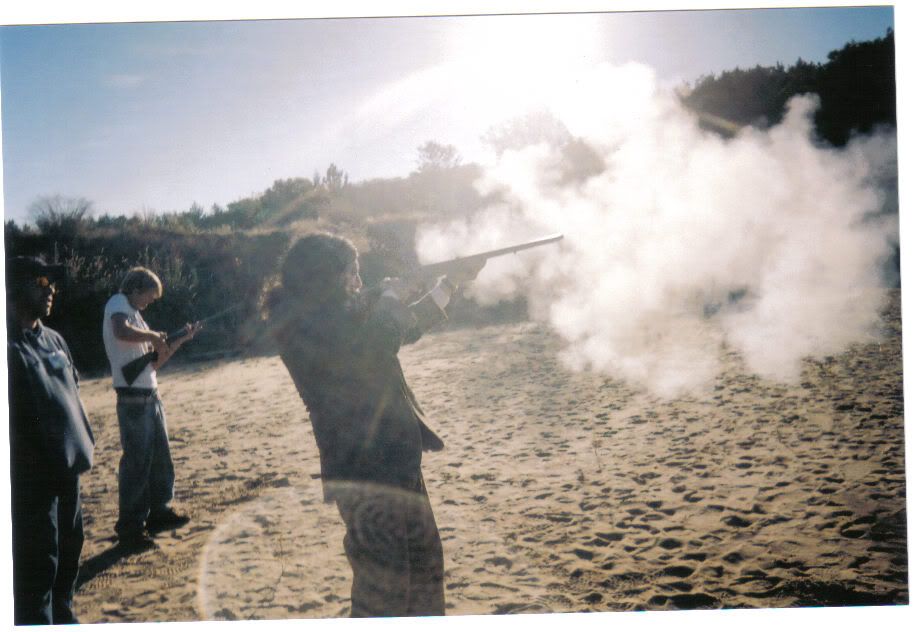| mehulkamdar |
| (.416 member) |
| 09/08/05 11:40 PM |

|
|
|
I hope that Mickey and others who may be interested find this information useful. I contacted W W Greener to get a detailed description of their Facile Princeps double rifle/shotgun action, considered the strongest weight for weight among all break open action types and he replied as follows:
The Anson & Deeley (or boxlock) action was invented in 1875 (patent 1756 of
1875). In this patent the tumblers are cocked by raising the breech end of
the barrels on opening the breech. Pivoting around the hinge pin is a
cocking lever which has a projection protruding through the front of the
action body into the fore end. The other end of the cocking lever is below
the prolonged forearm of the tumbler. After firing the tumbler forearm
rests against the cocking lever. As the breech is opened and the fore end
moves downwards, the front end of the cocking lever is forced down and the
rear end is forced up, moving the tumbler into bent against the mainspring
until held by the sear. When the barrels are closed the tumbler remains
cocked but the cocking lever returns to its original position. The gun can
then be fired.
This action was one of the major advances for breech-loading shotguns and
rifles, being easier to manufacture and simpler than the traditional
side-lock actions made by most other gunmakers. W W Greener was paying
Westley Richards who owned the Anson & Deeley patent a 15 shilling Royalty
for each gun he made which employed the A & D action. Clearly it was to his
advantage to find a way around the patent so he could make similar guns
without the disadvantage of paying one of his competitors for the priviledge
of using one of their designs.
In 1880, five years later, W W Greener patented his own 'Facile Princeps'
action. Like the A&D the locks were housed in the underside of the action
but instead of cocking the tumblers with a lever actuated by the fore end he
used a hook on the barrel lump for cocking. The fore end of the gun was not
used in any way to cock the gun and this was later proved in court as the
essential difference between the two mechanisms. Facile Princeps tumblers
have extended fore arms which are turned inwards towards each other. This
is so they engage on the hook in the front barrel lump. The hook is
attached to the front barrel lump so that the lower part lifts the extended
forearm of the tumblers into bent when the breech is opened to reload. On
closing the breech the tumbler is retained by the sear and the hook on the
lump returns to its original position, ready to cock the gun again when it
has been fired.
This invention upset Westley Richards who thought the Facile Princeps worked
on the same principle as their own A&D action, so they took W W Greener to
court in 1881. Greener won the day although Westleys were given leave to
appeal which they did in 1883 at the Court of Appeal, where the case again
went Greener's way. It finally reached the House of Lords in 1884 where
Westleys lost again. The difference in the two mechanisms lies in the
sliding rod in the front barrel lump which moves to position the hook so it
engages with the turned in end of the tumblers. Westleys argued that this
acted like their cocking lever. However the Law Lords decide that this was
not the case, the sliding rod in the Facile Princeps did not affect the
cocking of the gun, its only use was to allow the gun to be dismantled. The
rod actually allows the hook to move back so that it clears the bridge of
the action (between the two barrel lumps) when the gun is opened - that is
its only function.
I hope the above is helpful - a bit technical but it is a fairly complicated
issue as three court cases testify. There is more information in my book
'The Greener Story' still available through me, or there is an order form on
our web site at http://www.wwgreener.com
I will leave you to post the details on your forum.
Regards
Graham N. Greener
Best wishes, gentlemen, and good hunting!